"Aut inveniam viam aut faciam" (or "Aut viam inveniam aut faciam") is Latin for "I shall either find a way or make one".[1][2][3] The first word "aut" may be omitted, corresponding to omitting the English word "either" from the translation.
The phrase has been attributed to Hannibal; when his generals told him it was impossible to cross the Alps by elephant, this was supposedly his response. The first part of the sentence, "inveniam viam", "I shall find a way", also appears in other contexts in the tragedies of Seneca, spoken by Hercules and by Oedipus, and in Seneca's Hercules Furens (Act II, Scene 1, line 276) the whole sentence appears, in third person: "inveniet viam, aut faciet."[4]
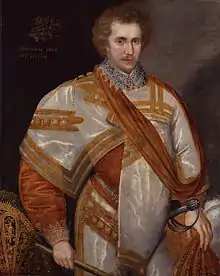
It has been used as a motto for instance by Francis Bacon[5] as well as Robert Peary. It still is popular in social, educational and military organisations.[6]
In first person plural, the quote is written on an iron arch over the class of 1893 memorial gate at the University of Pennsylvania.[7] A painting in the National Portrait Gallery, formerly attributed as Sir Philip Sidney and now thought to depict his brother Robert, is adorned with the phrase.[8] In The Dunciad, Alexander Pope writes of John Henley that he "turned his rhetoric to buffoonry" by handing out medallions engraved with this motto.[9]
 Robert Peary's signature 10 June 1907 with quote
Robert Peary's signature 10 June 1907 with quote Peary's grave at Arlington National Cemetery
Peary's grave at Arlington National Cemetery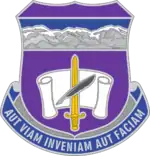 Emblem of the U.S. Army 440th Civil Affairs Battalion of Fort Carson, Colorado
Emblem of the U.S. Army 440th Civil Affairs Battalion of Fort Carson, Colorado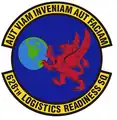 Emblem of the USAF 628th Logistics Readiness Squadron of Joint Base Charleston
Emblem of the USAF 628th Logistics Readiness Squadron of Joint Base Charleston Emblem of the USAF 405th Expeditionary Operations Support Squadron (provisional)
Emblem of the USAF 405th Expeditionary Operations Support Squadron (provisional)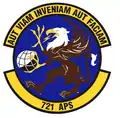 Emblem of the USAF 721st Aerial Port Squadron of Ramstein Air Base, Germany
Emblem of the USAF 721st Aerial Port Squadron of Ramstein Air Base, Germany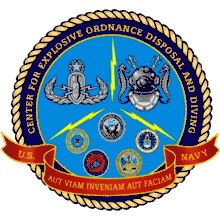
References
- ↑ A New Dictionary of Quotations from the Greek, Latin, and Modern Languages, J.B. Lippincott & Co., 1869, p. 229
- ↑ Belton, John Devoe (1890), A Literary Manual of Foreign Quotations, Ancient and Modern, G.P. Putnam's Sons, p. 18
- ↑ Stone, Jon R. (2004), The Routledge Dictionary of Latin Quotations, Routledge, p. 140.
- ↑ "Seneca, Hercules Furens, line 205".
- ↑ Reid, Thomas; Walker, James; Hamilton, William (1850), Essays on the Intellectual Powers of Man, J. Bartlett, p. xii.
- ↑ Cf. Chigwell School, Holton-Arms School, Capitol Technology University, South Ural State University, Combat Logistics Battalion 24, Rhodes Knights, Croxley Green#York House School, St. George's Girls' School, Center for Explosive Ordnance Disposal & Diving.
- ↑ "Inveniemus viam aut faciemus" http://hdl.library.upenn.edu/1017/d/archives/20050203019
- ↑ Gavin Alexander: Writing after Sidney. The Literary Response to Sir Philip Sidney 1586–1640. Oxford University Press, Oxford, New York 2006, ISBN 978-0-19-928547-1, p. 158, n. 40.
- ↑ Pope, Alexander (1736), The Works of Alexander Pope, L. Gilliver and J. Clarke, pp. 206–208.